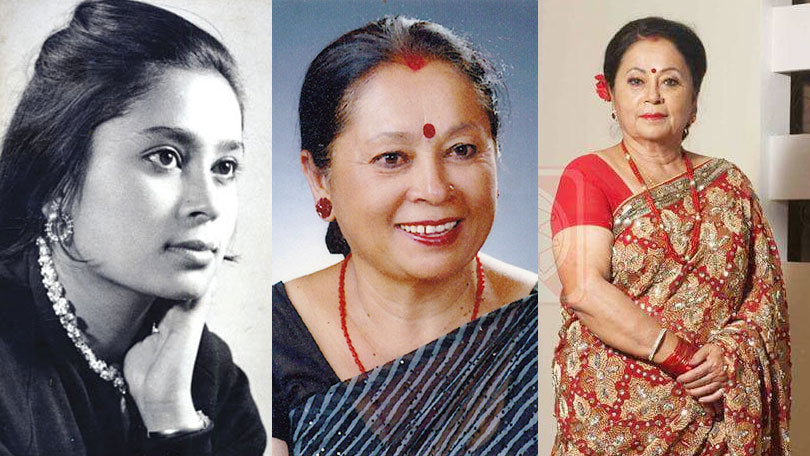When filmmaking began in Nepal in the 1960s, doing a film was not considered a ‘respectable’ job for women. The then society used to look down upon women involved in the entertainment sector. However, Bhuwan Chand, the first actress in Nepali film, dared to take a career in film defying all the stereotypes.
Living history as the pioneering female figure in Nepali filmdom, Chand has been relentlessly active on the silver screen for over six decades. One of the most revered artists of Nepal, she is no less active than the new generation today even at the age of 72.
Born in Kathmandu in 1949 Chand is a great inspiration not only for women but also for those who are easily on tenterhooks in even slightly unfavorable circumstances. “I never get angry, I have no greed, I never speak ill of anyone and I never get lazy and this is the secret of my success, says the senior actress.”
In 1964, Nepal Government’s Department of Information decided to make the Nepali film “Aama” (Mother). And Chand was chosen as a lead actress for the first film ever produced within the country. Along with Chand, Shiva Shankar, Hari Prasad Rimal, Basundhara Bhusal, and Chaitya Devi did their roles in the film Aama. She said it was not a mean feat for her as even at that time, she was chosen for the lead role through an audition.
Though she made her historic debut as the first actress in 1964, she had already started her acting journey in theatre in 1953 when she was only four years old. Chand gives credit to her father Bhairav Bahadur Thapa for sparking her interest in acting.“My father was my first inspiration who encouraged me to act on stages at a tendered age,” she says.
She has a memory of that time when art was not considered a respected profession and even parents did not allow their children to pursue this discipline. Even sons were not allowed to engage in acting, not to talk about the situation of girls, she recalled the perception of society towards films five decades back.“But my father propped up me to act and while doing stage shows and dramas, I became addicted to the art,” she says.
Bhuwan started working at Rastirya Nach Ghar (National Theatre) in 1961 and she got a permanent job there in 1976. In 1960, she did Prakritiko Prerana, a lyrical drama, as a lead actress opposite to Yadab Kharel in the presence of the then King Mahendra and members of the royal family. Sharing how she felt when she was chosen lead actress for Aama, she said “I was over the moon when I got to play in the film. But at that time, just one film used to be made in a year. So, after Aama, I had to keep myself busy in the stage shows.”
A year after the release of Aama, she again got an opportunity to do the lead role in Hijo Aaja Ra Bholi, the second film produced in Nepal. Later, she was offered the role of Mala Sinha’s daughter in the film Maitighar, the first film produced from the private sector in Kathmandu.
Initially, she was excited to share the screen with Mala Sinha, but she did not do the film because she was not satisfied with her role in it. After Maitighar, filmmaking slowed down again in Nepal with one film being produced in four or five years, and she had to be content with the stage shows. After getting married in 1976 with Harish Chand, she went to Germany for two years with her husband.
After returning home from Germany, she was offered a role in Nir Shah’s Basudev, but for personal reasons, she rejected the offer. Later, she acted in Koseli, Dui Thopa Aasu, and many more films. Youthfulness was important to play the lead role in the film then, she says. “After returning from Germany, I started acting in character roles rather than doing the main roles.” She has acted in about three dozen films with Prem Geet -2 and Selfie King being the latest ones.
She has acted in more than a dozen TV serials and is currently doing the TV serial Drishti aired on Ramailo TV. She is also busy in music videos these days. Bhuwan produced a Nepali feature film Saino. However, it was not commercially successful. Talking about the films than and now, she says that even though fewer films used to be produced in those days, their quality was better. Then, films used to carry stories and the stories remained in the mind and heart of the audience for a long time.
Now, many films are being made but the moviegoers forget the story as soon as they leave the theatres or switch off their television sets. She says that the present-day filmmakers have been unable to make a film according to the story sought by the audience.
My childhood, youth, and old age have been spent in the field of art, but till today I have not received the respect I deserve from the government. I received the ‘Rastriya Pratibha Puraskar’ five years ago but whether that was my right age to receive that award is something to think about, Bhuwan says. In 2019, she received ‘Bishistha Samman’ from Film Development Board Nepal.
Born in Kathmandu in 1949, Bhuwan attended Demonstration School which is now a laboratory school. After that, she was admitted to Ratna Rajya College but could not complete her IA programme, but she graduated in ‘Kathak Dance’.
The Nepali film industry has been hit hard sometimes by political reasons, sometimes by natural disasters, and now by the COVID -19 pandemic. She says that the government should help revitalize the film industry. She has an appeal for the audience to love Nepali films. She has a tip for a story writer to do adequate research works before writing a story of a film.
She has three daughters, all of them now live in the United States. She is now living with her husband in Kathmandu. “Art is a means of spreading happiness which fills the lips with laughter and contentment and I will continue my acting journey as long as I can,” she says.
Courtesy: Renuka Dhakal / risingnepaldaily.com

















